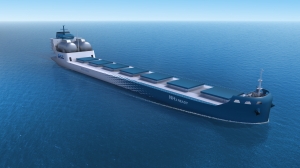


(Posted on 27/04/22)
Leading Classification Society ClassNK has issued an Approval in Principle (AiP) for the design of an ammonia-ready LNG-fueled Panamax bulk carrier developed by Planning and Design Center for Greener Ships (GSC).
Ammonia is expected to be used as ship fuel for decarbonization since it does not emit CO2 when burned. Meanwhile, taking adequate safety measures are impartial due to its characteristics of being toxic to humans and corrosive against materials, and ClassNK has worked on development of standards and certification.
In 2021, ClassNK published its “Guidelines for Ships Using Alternative Fuels” to minimize the risks related to ammonia-fueled ships for the ships, crew, and environment by stipulating requirements for installation, controls, and safety devices. ClassNK subsequently issued an Approval in Principle (AiP) for the design of an ammonia-fueled Panamax bulk carrier developed by GSC in January 2022.
GSC describes the newly developed design as LNG-fueled but ready for ammonia-fueled. For the short-term aiming lower CO2 emissions, it will be operated by using LNG fuel. For the long-term aiming toward zero CO2 emissions, it has two scenarios; in the first scenario, it is converted to ammonia fueled propulsion systems, in the second scenario, it will keep the systems but will switch its fuel from LNG to liquified carbon-neutral methane. The ship is developed as a flexible and efficient solution to enduring the unpredictable period of fuel transition.
ClassNK reviewed the design as an LNG fueled ship based on its Rule Part GF incorporating IGF Code, and as an ammonia-ready ship based on Concept Design category of its “Guidelines for Ships Using Alternative Fuels” Annex 1 verifying the conformity to their requirements as an LNG-fueled ship and a future ammonia-fueled ship, ClassNK has issued an Approval in Principle (AiP) as an ammonia-ready LNG-fueled ship.
ClassNK will continue participating in innovative initiatives related to decarbonization. By incorporating the expertise obtained from the collaborative work with frontrunners into its rules and guidelines, ClassNK will support the decarbonization of the entire industry.
At the initial stage of designing or before the specific target ship to be implemented is decided, the design is examined based on the existing regulations such as international treaties and ship classification rules, and an Approval in Principle (AiP) is issued as proof of conformity with requirements. It also prevents rework of regulatory aspects in the post-process, shortens the examination time at the time of class registration, and can be used as a technical basis for external appeal of the design status.
Columbia Group anticipates a period of strong expansion as an increasing number of international shipowners... Read more
Norse?Ship Management has expanded its use of Smart Ship Hub’s high frequency sensor data and... Read more
As the maritime industry gears up to welcome the IMO’s STCW bullying and harassment training amendments... Read more
NORDEN has acquired the cargo activities of Taylor Maritime in Southern Africa (previously operated... Read more
Philippos Ioulianou, Managing Director of EmissionLink, has warned the IMO’s decision to delay... Read more
VIKAND has highlighted the need for cultural change in the maritime sector as reports of bullying, harassment... Read more
The maritime industry is experiencing a period of significant transformation, driven by rapidly evolving... Read more
NorthStandard has advised Members of a 5% increase in P&I premiums for the marine insurance year... Read more
Anemoi Marine Technologies, the UK-based leading designer of Rotor Sails for wind-assisted ship propulsion... Read more
Helm Operations has announced that nine electronic record books within Helm CONNECT Logbook have been... Read more